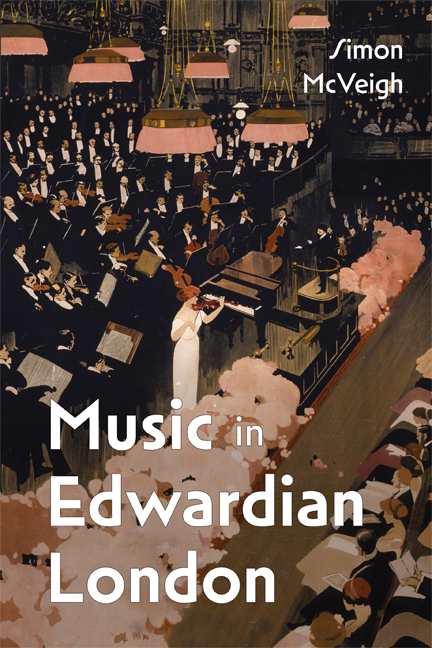Book contents
- Frontmatter
- Dedication
- Contents
- List of Illustrations
- Preface
- 1 Edwardian Soundscapes
- 2 Mapping a Musical City: Place (and Class)
- 3 Mapping a Musical City: Time (and Taste)
- 4 London as Musical Hub: Europe, America, Empire
- 5 The British Question
- 6 Britain and ‘Others’
- 7 Hidden Voices
- 8 From Battersea to Bermondsey: Suburban Music and Local Politics
- 9 London’s Music: An Overview
- Sources and Bibliography
- Index
- Miscellaneous Endmatter
9 - London’s Music: An Overview
Published online by Cambridge University Press: 09 May 2024
- Frontmatter
- Dedication
- Contents
- List of Illustrations
- Preface
- 1 Edwardian Soundscapes
- 2 Mapping a Musical City: Place (and Class)
- 3 Mapping a Musical City: Time (and Taste)
- 4 London as Musical Hub: Europe, America, Empire
- 5 The British Question
- 6 Britain and ‘Others’
- 7 Hidden Voices
- 8 From Battersea to Bermondsey: Suburban Music and Local Politics
- 9 London’s Music: An Overview
- Sources and Bibliography
- Index
- Miscellaneous Endmatter
Summary
IT's TIME TO EXAMINE my claim that many of the musical structures and attitudes of the later twentieth century were already embedded by the start of the First World War. And it's time for some final conclusions about the achievements of the ‘long Edwardian’ era.
❧ The status of music
One striking change was the new status that music attained across the period.
Despite bitter complaints against the upper echelons, music was clearly significant in the lives of many – especially among the much-derided nouveaux riches. Whether through influence, active involvement or financial support, the ‘upper ten’ played a much more significant role than is generally recognised – not only men, including the Speyers and Howard de Walden, but women such as Lady de Grey and the Princesse de Polignac. Nor should we underestimate the part that music played in the lives of London's most distinguished artists, from the Pre-Raphaelites to Sargent, himself an accomplished pianist. Fuller Maitland observed that in all such circles, ‘music as a topic of conversation’ had grown beyond recognition by 1914, joining contemporary art as worthy of serious discussion among the elevated classes.
Musicians were also increasingly accepted in society. In part this was a direct result of the social class of those entering the profession, especially those appointed to prominent institutional roles. Head of the Royal College of Music was the independently wealthy Hubert Parry, Oxford graduate and Professor, habitué of the Gladstone and Balfour circles, and one who (according to a confidential memo) would have been a candidate for the House of Lords, had the Liberals chosen to slant the house in their favour. At the RCM, Parry was matched by Stanford – also from a wealthy family, and educated at Cambridge, where he became Professor of Music.
Several other prominent composers, including Vaughan Williams, were of the gentleman class, as were some illuminati of musical theatre: Lionel Monckton's father, for example, was Town Clerk of the City of London. Music was already becoming respectable outside the well-trodden church route.
- Type
- Chapter
- Information
- Music in Edwardian London , pp. 278 - 294Publisher: Boydell & BrewerPrint publication year: 2024



